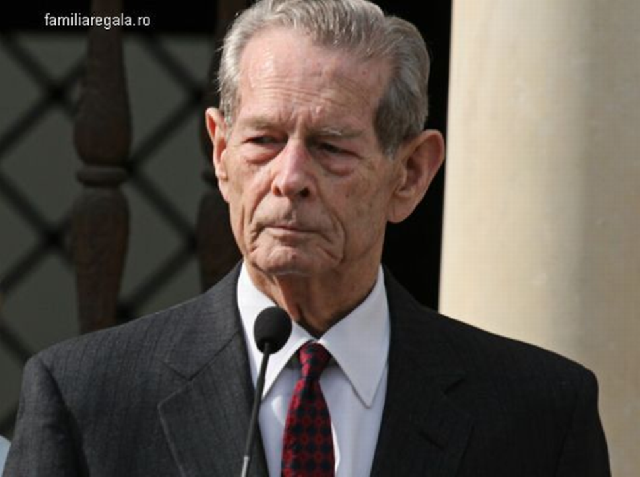The King of Romania
On Wednesday, Romanias last king, Mihai 1st, announced his withdrawal from public life.

Bogdan Matei, 03.03.2016, 13:41
Aged 94 and suffering from two types of cancer, king Mihai 1st has been recently operated on and is now undergoing a complex and difficult medical treatment. He has entrusted his daughter, princess Margareta, the Custodian of the crown, with the mission of carrying on his projects.
The former sovereign has also written a good-bye message, which was read publicly by the Royal Council Spokesman Andrew Popper: “I have recently received a serious medical diagnosis. This situation coincides with the period in which the family and the country are celebrating 150 since the setting up of the dynasty and of the Romanian modern state. I am sure that my daughter Margareta, the Custodian of the Crown, will find the necessary wisdom and strength to represent me and to carry through all the public actions that I have initiated. I have requested the Royal Council to carry on its mission and to help the Custodian with advice. Signed: King Mihai, March 1st, 2016.”
This situation brings to an end a chapter in the history of Romania that has been both heroic and tragic. Barely a grown-up, at the age of 19, Mihai 1st became King of Romania in 1940, after the abdication of his unpopular father, Carol the 2nd. Seen as immature and easy to manipulate by the iron man of the time, Marshal Ion Antonescu, which had placed Romania on the orbit of Nazi Germany, the king stayed in the shadows for a very long time. However, on August 23rd, 1944, when the outcome of WWII had already become easy to predict, the young sovereign was brave enough to arrest the marshal and pull out the country from the alliance with Hitler and place it on the side of its traditional allies, the British and the Americans. According to historians, that change of sides shortened the war by at least six months and saved hundreds of thousands of lives.
However, both Romania and its King were refused the right to stand among the winners. On December 30th, 1947, when the country was practically under Soviet military occupation and was led by a shadow communist government, the King was forced to abdicate and go into exile. For decades, the only way in which he could relate to his people, which remained trapped behind the Iron Curtain, was through radio messages.
Marked by the ideological prejudice imposed throughout decades of dictatorship, the leftist power instated after the Anti-Communist Revolution of 1989, forbade the King access to his own country. It was only in 1997 that the predominantly Christian — Democratic government facilitated his return and granted him Romanian citizenship again, also returning part of his properties. So, once again, the King unconditionally placed himself in the service of the country.
He promoted Romania’s accession to NATO and the EU, stood for rendering state institutions democratic and free of communism, got involved in charity and patronage programs and thus became one of the most respected and loved public figures.
Romania’s President Klaus Iohannis has voiced hope that the King will find the power to get over these difficult times and that the Royal Family will remain the same beacon of hope and solidarity.
In turn, Prime Minister Dacian Ciolos has recalled that for decades, His Majesty, the former Sovereign of Romania, has been for this people a source of love, hope and support.






























